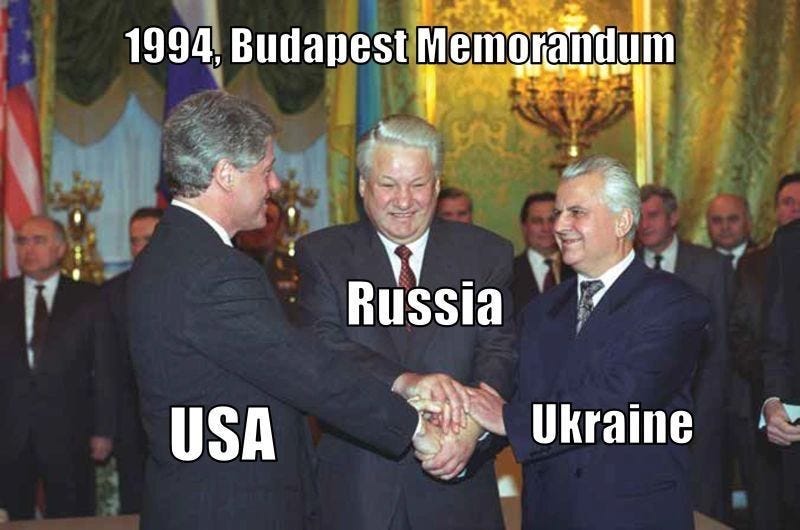The Budapest Memorandum Mistake
Failed Geopolitics
A Cautionary Tale of Disarmament and Broken Assurances

The Budapest Memorandum, signed in 1994, was a landmark agreement designed to promote nuclear disarmament and ensure Ukraine’s sovereignty and security. While it initially appeared to be a diplomatic triumph, the memorandum has since become a symbol of the dangers of misplaced trust in international assurances and the vulnerabilities of disarmament. Ukraine’s decision to relinquish its nuclear arsenal — then the third-largest in the world — was heralded as a step toward global stability, but the subsequent violations of the agreement by Russia have had devastating consequences for Ukraine and far-reaching implications for international security.
This article examines the origins of the Budapest Memorandum, Ukraine’s decision to disarm, the warnings of scholars like John Mearsheimer, and the geopolitical repercussions that echo to this day.
The Context: Ukraine’s Nuclear Arsenal
In the aftermath of the Soviet Union’s collapse in 1991, Ukraine inherited a massive nuclear arsenal, comprising approximately:
1,900 strategic nuclear warheads.
Long-range ballistic missiles capable of striking targets across continents.
A fleet of long-range strategic bombers.
Over 1,000 cruise missiles.
This arsenal made Ukraine the third-largest nuclear power in the world, behind only the United States and Russia. However, Ukraine faced significant challenges:
Technical Dependence: The nuclear weapons were operationally tied to Russia’s command-and-control infrastructure, limiting Ukraine’s independent use of the arsenal.
Economic Strain: Maintaining and modernizing the nuclear weapons system required resources Ukraine lacked in its post-Soviet economic turmoil.
International Pressure: The global community, particularly the US and Russia, sought to prevent nuclear proliferation and urged Ukraine to disarm.
The Budapest Memorandum: Promises Made
In December 1994, Ukraine agreed to relinquish its nuclear arsenal in exchange for security assurances provided by the United States, the United Kingdom, and Russia under the Budapest Memorandum. The key terms included:
Respect for Sovereignty and Territorial Integrity: The signatories pledged to refrain from threatening or using force against Ukraine.
Assurances of Independence: Ukraine’s political independence would be respected.
Prohibition of Economic Coercion: Signatories agreed not to apply economic pressure to influence Ukraine’s decisions.
Assistance in Case of Threats: Ukraine could request consultations if its sovereignty was challenged.
Ukraine followed through with its commitments:
Decommissioning of Nuclear Weapons: By 1996, Ukraine transferred its nuclear warheads to Russia for dismantling.
Destruction of Strategic Assets: It destroyed its long-range bombers and over 1,000 cruise missiles.
In exchange, Ukraine received written assurances, not legally binding defense guarantees, leaving a crucial ambiguity in the agreement’s enforceability.
The Warnings: Mearsheimer’s Prediction
Before the Budapest Memorandum was signed, renowned political scientist John Mearsheimer published an article arguing that Ukraine should retain its nuclear weapons. His reasoning was prescient:
Nuclear Deterrence: A nuclear-armed Ukraine would deter Russian aggression, as any conflict could escalate into a catastrophic nuclear exchange.
Geopolitical Stability: Mearsheimer believed that nuclear weapons would stabilize the region by preventing a power imbalance between Russia and Ukraine.
Avoiding Catastrophe: He warned that without nuclear deterrence, Ukraine risked a Russian invasion, leading to its conquest and destabilization of Europe.
Mearsheimer’s predictions have come to pass. In 2014, Russia annexed Crimea, and in 2022, it launched a full-scale invasion of Ukraine. These actions shattered the security assurances of the Budapest Memorandum and exposed the dangers of disarmament without enforceable guarantees.
The Fallout: Violations and Betrayal
Russia’s actions in Crimea and the ongoing war in Ukraine represent blatant violations of the Budapest Memorandum. The implications are stark:
Sovereignty Undermined: Russia’s invasion disregards Ukraine’s territorial integrity, a cornerstone of the agreement.
Weapons Turned Against Ukraine: Reports suggest that some of the missiles Ukraine relinquished to Russia have been used in the conflict, a cruel irony.
Limited Western Response: While the US and UK have supported Ukraine with sanctions, military aid, and diplomatic backing, they have not intervened directly. Critics argue this falls short of the spirit of the Budapest Memorandum.
Global Implications
Erosion of Trust in Disarmament Agreements:
Ukraine’s experience undermines confidence in international assurances. Other nations may hesitate to disarm or enter similar agreements, fearing betrayal.
North Korea has explicitly cited Ukraine as a cautionary example, reinforcing its determination to retain nuclear weapons.
Proliferation Risks:
The breakdown of the Budapest Memorandum could encourage nuclear proliferation as nations prioritize self-defense over disarmament.
Efforts to curb nuclear programs in countries like Iran or North Korea face greater skepticism.
Regional Instability:
Russia’s aggression in Ukraine has destabilized Europe, leading to widespread economic and humanitarian crises.
NATO has been drawn into the conflict indirectly, increasing tensions between nuclear-armed powers.
Lessons for Security Policy:
The ambiguity of “assurances” versus “guarantees” highlights the need for enforceable agreements with clear consequences for violations.
Collective defense mechanisms, like NATO, remain crucial for protecting smaller nations from aggression.
Ukraine’s Mistake: A Hindsight Perspective
Ukraine’s decision to disarm, while made under immense international pressure, is now viewed as a strategic misstep. Without nuclear deterrence, Ukraine became vulnerable to Russian ambitions. While it demonstrated Ukraine’s commitment to global non-proliferation, the lack of binding guarantees left it defenseless against future aggression.
Conclusion: A Sobering Legacy
The Budapest Memorandum, intended as a triumph of diplomacy and disarmament, has become a cautionary tale of broken promises and strategic miscalculations. Ukraine’s plight underscores the fragility of international agreements and the dangers of placing trust in assurances without enforceable mechanisms.
As the world watches the ongoing conflict in Ukraine, the lessons of the Budapest Memorandum resonate loudly. They remind us of the importance of credible deterrence, the consequences of apathy toward sovereignty, and the need for a unified global response to aggression. If there is one clear takeaway, it is this: peace cannot be secured through disarmament alone — it requires accountability, vigilance, and the collective will to uphold justice.
The Budapest Memorandum Mistake was originally published in Information-Warfare Magazine on Medium, where people are continuing the conversation by highlighting and responding to this story.

